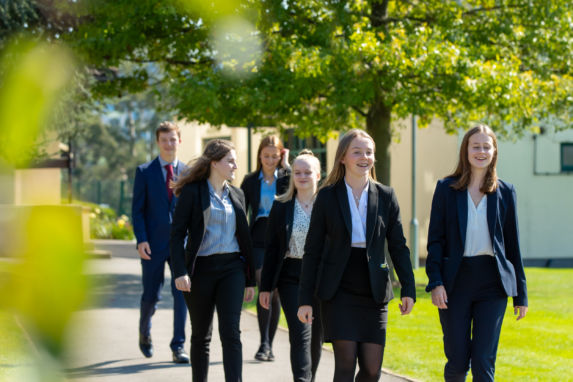Language
Date Posted: 30th August
Categories: Sixth Form
Reaching the end of formal schooling is a huge moment in anyone’s life. There are big decisions to be made, and it is a significant moment of change that can be unsettling and overwhelming. However, knowing your options and exploring what to do post-16 is important. It can help you feel more comfortable about those next big steps and make the right decision for you.
We’re looking more closely at what happens after you “finish” school at 16 in the UK and what your options are when full-time education is considered complete. Let’s explore your post 16 education options and what you may consider the best choice going forward.
Post 16 education and further education refers to all post-16 learning and incorporates vocational training and work-based learning as well as more formal further education environments. In some environments, Post-16 education can include children as young as 14 enrolled on the 14-19 vocational curriculum.
Post 16 education and training takes place in many environments, including school sixth forms, academies and individual sixth form education colleges. It also takes place in further education institutions, community learning centres and in provisions provided by private training companies, volunteering organisations and work-based learning providers.
The law on Post-16 education differs in the different countries of the United Kingdom. In England, you can leave school on the last Friday of June if you’ll be 16 by the end of the school holidays. You must then follow one of these pathways until you are 18:
In Scotland, Wales, and Northern Ireland, pupils can leave school at 16, with the date for leaving dependent on their birth date in relation to the school year.

Post 16 education has been compulsory in England since September 2013. At this time, new legislation passed that states young people must continue in education, employment or training until the age of 18. Before this, pupils in England could leave school at 16.
Your post 16 options are more varied than you might think, and it’s worth spending some time considering the different possibilities open to you. You can choose between remaining in education or finding a programme that combines work and academic study. There are different courses you can try and different ways to combine work and study and we’ll look at each in turn below.
A Levels is one of the most popular routes for further education after school. You can carry on studying the subjects you took for GCSE or choose new subjects you are interested in. Most students take 3 A Levels and specialise in subject areas they have a keen interest in. It’s the most traditional route to university and leads you towards an academic route forward if you wish to enter higher education.
T Levels are a more work-focused approach to learning. They are equivalent of 3 A Levels, and pupils will study a single T Level to a high standard. T Levels include at least 45 days of industry placement work, meaning you gain work experience as well as academic learning with this kind of approach. T Levels are designed in partnership with specific employers to train students in the specific employability skills and knowledge to enter the workplace.
This type of qualification may be industry or job role specific. You may prepare for a specific career area such as health and social care or engineering, or you may train in an individual job role such as chef or hairdresser. The qualifications you earn are job specific and set you up with a vocational set of skills for the world of work.
Traineeships are a combination of learning and work experience. Traineeships are courses that include a work placement with the aim of preparing you for an apprenticeship or specific job role. You get the chance to combine work experience with the opportunity to improve your maths and English skills. Traineeships prepare you for the world of work or further education.
Apprenticeships are available at post 16 level up to degree level qualification. They combine on-the-job training with opportunities to learn and classroom-based learning. You get training and practical learning specific to the job role your apprenticeship is focused on. The work-to-study ratio should be 80:20, and many apprentices find a role in the company they did their training, though this is not always the case.
Wycliffe offers an exceptional and high-quality sixth form experience for pupils looking for their next move after school. Our post 16 options are varied and designed to give pupil’s the ultimate opportunity to succeed.
Our range of A Level options includes the most popular academic subjects such as English and Mathematics but also some more diverse offerings, including Japanese and Economics. Students have the opportunity to select the subject they excel in or make considered choices based on their hopes for university. We are extremely proud of our A Level performance, and our results speak for themselves, with pupils securing places at some of the world’s most renowned institutions.
Our BTec full time courses give pupils the chance to achieve the equivalent of 1 or 2 A Levels over a 2-year period. They focus on giving students the chance to use their individual practical skills through different assessment methods to suit their needs. Wycliffe offers three different BTec courses:
BTEC Business
This comprehensive business course uses a variety of assessment techniques, making it stand out from the more formal examination and coursework utilised for A Level Business.
CTEC Digital Production
This course is designed for pupils looking to find a career in media. It gives the opportunity to explore a wide range of media industries and get an introduction to different roles and study areas. Students have the chance to experience media production, digital photography and more.
BTEC Sport
Anyone looking to study sports or sports science at university or finding a career in the world of sport can benefit from this BTEC course. It is predominately coursework based and gives students the chance to focus on their preferred area of sport.
The Extended Project Qualification can further help you stand out from the crowd and show potential universities you’ve got what it takes to succeed. It is equivalent to half an A Level and provides between 8 and 28 points. The EPQ can take the form of your choosing. Many pupils write a 5,000-word report while others undertake a musical or dramatic performance with a shorter 3,000-word report. It is also possible to design or produce an artistic or technological product alongside a 3,000-word report too. Many universities regard the EPQ very highly and may even lower their offers to applicants completing this project.
Wycliffe has a dedicated Careers Department to support pupils in their next move after school. Our careers management department welcomes pupils in to chat about their options, and they also have full access to the Careers library and digital resources. We want to give our pupils the tools they need to make informed decisions for their future careers. We support our pupils in developing career management skills including financial support, and regularly schedule career activities to promote the importance of finding their niche in the world of work.
Our Careers Department is run by our highly-trained Career Education Manager, Caroline Hiorns, who holds Level 7 qualifications and is a registered career development professional.
Wycliffe has always prided itself on giving pupils the highest level of support when it comes to their wellbeing and pastoral care, not just their academic success. Pupils have many points of contact they can access to discuss any feelings, thoughts or problems. Form tutors are perfectly positioned to support pupils. Still, there are also other professionals, including our Head of Sixth Form, onsite medical staff and the College Chaplain and Deputy Head Pastoral, who are here and ready to listen. A Levels and post 16 education can be hard-going, and it is a significant step up from GCSEs so it can be good to have someone to speak to. Our Pastoral Care Team are always available to support our pupils.
We truly believe the Wycliffe experience is about much more than what happens in our classrooms. This does not stop when pupils enter the sixth form. Our extra-curricular programme offers ample opportunities to explore your passions, find new talents, and nurture new and interesting practical skills. We endeavour to offer an extensive and diverse range of extra-curricular opportunities to our sixth form pupils. We have over sixty different activities running every week and give our pupils every opportunity to find a passion or talent to call their own. Our programme includes a wide range of sports, drama and music programmes as well as more unusual offerings such as cryptology, Student magazine, War gaming and Model United Nations.
We want our sixth form pupils to reach their goals, and for some, this means attending some of the world’s top educational institutions outside of the UK. We attract pupils who are solely focused on preparing for the SAT examination for US university entry, and we are proud to have many pupils now studying at top universities in America, including Ivy League institutions.
We appreciate our pupils’ ambitions extend beyond our borders, and we have an American and Overseas University Co-ordinator who helps pupils prepare for the PSAT, SAT and ACTs, as well as overseeing the applications and choice of universities around the world.
Wycliffe College is a leading independent school and sixth form nestled into the beautiful Gloucestershire countryside. We attract fantastic pupils from around the world and are always keen to invite new pupils to gain experience the Wycliffe way. Attending our sixth form is a fantastic way to further your education and give yourself the chance to advance your academic progress and become part of a thriving local community at the same time. Please get in touch directly to find out more about our post 16 education options and to arrange a school visit.
A private or independent Sixth Form, also referred to as Year 12 and 13, is a school offering post-16 education in a private setting. Many private Sixth Forms are attached to independent schools though there are some fully independent private Sixth Form institutions too. They differ from state Sixth Forms due to fees being paid, and soin most instances, the level of education, access to opportunities like extracurricular activities and university preparation is higher in a private setting.

Related Articles